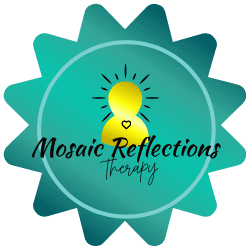Finding Calm in the Chaos: Essential Self-Care Strategies to Help Overwhelmed Parents

Welcome to Mosaic Reflections Therapy! Eleena Hardzinski, LMFT understands the relentless demands of parenting and the importance of self-care for maintaining your well-being. Parents often neglect their own needs while nurturing their children, leading to burnout and exhaustion. However, it is crucial to remember that taking care of yourself is not a luxury but a necessity. In this blog post, we’ll explore several essential self-care strategies that can help you find balance and tranquility in your parenting journey.
Understanding the Importance of Self-Care
Before diving into the tips, let’s establish why seeking help in finding self-care strategies is paramount. As a parent, you are the anchor of your family. Your well-being directly impacts your children’s emotional and psychological health. Studies have shown that parents under stress may inadvertently contribute to the stress levels of their children, creating a cycle that’s hard to break. Thus, prioritizing your self-care is not selfish—it’s a means to ensure the whole family thrives.
Helping Parents Find Self-Care Strategies
Implementing self-care doesn’t have to be overwhelming. Small, intentional actions can make a significant difference. Here are a few strategies to consider:
Create a Routine
Establishing a daily routine can provide a sense of control and predictability amidst the chaos of our daily lives. It can help us stay grounded and focused by providing structure and routine to our day. Even simple acts such as setting aside time for a cup of tea or taking a short walk can help us relax and recharge.
A consistent daily routine that includes fixed times for meals, sleep, and relaxation can be especially beneficial for both you and your children. A regular sleep schedule can help improve the quality of your sleep and ensure that you get enough rest to tackle the challenges of the day ahead. Similarly, maintaining consistent mealtimes can help regulate your appetite and provide the necessary energy to power through your tasks.
Make sure to include some time for relaxation and rejuvenation in your routine. Whether it’s reading a book, taking a warm bath, or spending time with loved ones, engaging in activities that bring you joy and fulfillment can help reduce stress and improve your overall well-being.

Overall, establishing a consistent daily routine can be a powerful tool for managing stress, improving productivity, and enhancing your quality of life. So, take some time to create a routine that works for you and your family, and stick to it as much as possible. Your mind and body will thank you for it!
Physical Activity
- Exercise: Physical activity is a powerful stress reliever. Find an activity you enjoy—whether it’s yoga, running, or dancing—and commit to it regularly. Exercise can help reduce feelings of anxiety and boost your mood. CDC recommends at least 150 minutes of moderate-intensity activity each week.
- Short Breaks: If a full workout isn’t possible, even brief periods of movement throughout the day can help. Stretching or a quick walk around the block can rejuvenate your mind and body.

Nutrition
Never underestimate the power of a balanced diet on your mood, energy levels, and mental health. Prioritize whole foods and try to minimize processed foods and sugars. The food we consume provides the essential nutrients, vitamins, and minerals that our brain needs to function optimally. Research has shown that consuming a diet rich in whole foods such as fruits, vegetables, whole grains, and lean proteins can improve mood and energy levels, and reduce the risk of depression and anxiety. On the other hand, a diet high in processed and sugary foods has been linked to increased levels of inflammation, which can negatively impact mood and cognitive function.
Drinking enough water is also essential for physical health and cognitive function. Additionally, consuming large amounts of caffeine and alcohol can lead to dehydration, which can cause fatigue and irritability.
It’s important to note that eating a healthy diet doesn’t mean depriving yourself of your favorite foods. Instead, it means prioritizing whole foods and trying to balance your diet with a variety of food groups. The Harvard Healthy Eating Plate provides a visual guide to creating nutritious and balanced meals.

Mental Well-being
- Meditation: Incorporating mindfulness practices like meditation can help calm your mind and reduce stress. Even a few minutes a day can make a difference.
- Social Connections: Stay connected with friends, family, or support groups. Sharing experiences and feelings with others can provide comfort and perspective.
- Professional Support: Sometimes, we need extra help to navigate parenting challenges. Services like Parenting Therapy offered by Mosaic Reflections Therapy can provide valuable self-care strategies and support.
Rest and Sleep
Adequate sleep is vital for overall mental and physical health. Sleep deprivation can negatively impact our immune system, cognitive abilities, mood, and overall well-being. If nighttime sleep is interrupted, try to find time for short naps or simply periods of rest during the day. Practice good sleep hygiene by creating a calming bedtime routine and environment. Examples include taking a warm bath, reading a book, or listening to soothing music before going to bed. You may also want to avoid caffeine and electronic devices before bedtime, as they can interfere with your sleep.
Finding Personal Time
Amidst the hustle and bustle of parenting, finding personal time can seem impossible. Yet, it’s important to carve out moments for activities that nourish you. Whether it’s reading, gardening, or pursuing a hobby, these personal pursuits can provide a much-needed respite and remind you of your identity beyond being a parent.

Conclusion
Embracing self-care is a journey, one that is not without its challenges, but it is essential for your well-being and your family’s happiness. At Mosaic Reflections Therapy, Eleena Hardzinski, LMFT, is dedicated to helping parents like you navigate the complexities of parenthood with grace and resilience. Remember, taking the time to care for yourself is the cornerstone of being the best parent you can be. Reach out to us for a free consultation and take the first step towards a balanced and fulfilling parenting experience.






